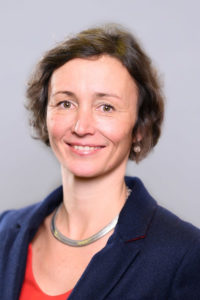Since 1 March 2020, Professor Dr Anna-Katharina Hornidge has been the new Director of the German Development Institute / Deutsches Institut für Entwicklungspolitik (DIE). The newsletter editors asked her about the initial goals and challenges she sees for her work at DIE and what is moving her these days.

Editors: What are you looking forward to most in your new role as Director of DIE?
Anna-Katharina Hornidge: I am looking forward to, together with the entire team of DIE, filling this very special field of expertise and partnership that we cover here at the institute. It lies between empirical development research and theory discussion, an explicitly communicated orientation towards applying the research, policy advice as well as university teaching and training. This broad setup offers us the exciting opportunity to constantly challenge ourselves scientifically and within the policy realm.
Editors: What role do you currently see for global cooperation and development research in times of Corona?
Anna-Katharina Hornidge: The Corona crisis is testing the structures of global cooperation and collaboration. Are they, and the claim to solidarity that defines them, viable and workable in times of increasingly demarcated borders? Many of our partner countries in Asia, Africa and Latin America will be severely affected by the crisis. Some are affected already. The task of development research and policy is to support health systems, the economy and social systems in our partner countries in overcoming the crisis in the interests of the global common good. Germany must ask itself what role it wants to play in the international system of states during and after the crisis – and act accordingly now. Germany’s Presidency of the Council of the European Union, which we will assume in the second half of this year, is an opportunity to demonstrate a pioneering role in development policy.
Editors: What would you like to be able to say after 100 days in office?
Anna-Katharina Hornidge: My original plans were to establish a marine governance research focus. Additionally, it is our aim to jointly develop further the third-party funding strategy of the institute. In terms of content, I would like to reflect on the Institute’s current research strategy together with the scientists, and we want to address the question of what kind of science, policy advice and training the DIE stands for under its new management. These points continue to play an important role. However, they have been complemented by the current global situation: At the moment, the focus is on keeping an eye on the health and special situations of our staff and at the same time ensuring that we continue fulfilling our mandate as an institute also under the current circumstances. I would therefore like to take this opportunity to express my sincere thanks for the special commitment of all employees of DIE in these dynamic times: I would like to thank all those in the administration who support me and the management in realizing flexible solutions, and all academic staff members who continue to ensure research, training and consulting for the institute in this situation characterized by substantial uncertainty. I would also like to thank the lively network of DIE, you and many other partners and friends of the institute, who continue collaborating virtually and creatively. On the basis of this great support, I am nevertheless looking forward to the first and all following weeks in office with much joy and optimism.

Schreibe einen Kommentar